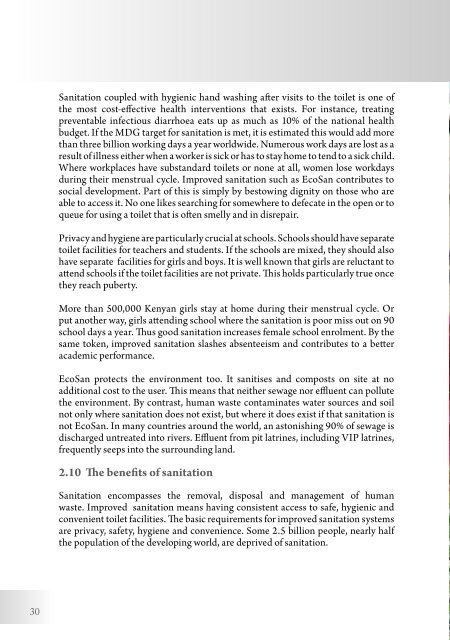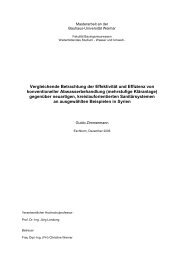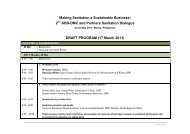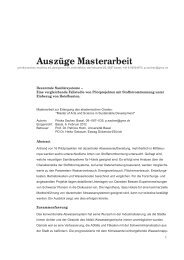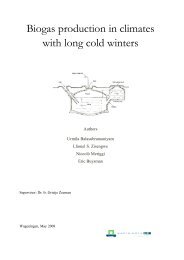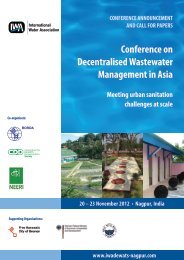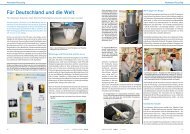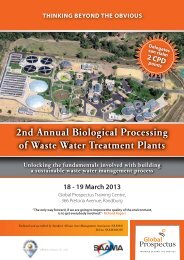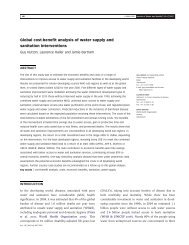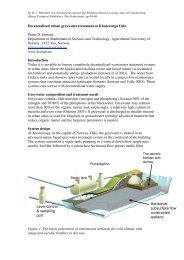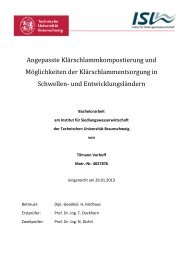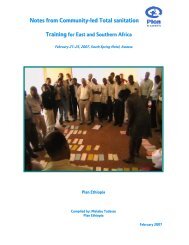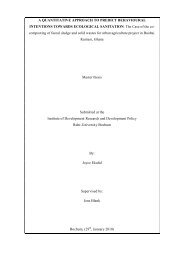Technical Guide to EcoSan Promotion
Technical Guide to EcoSan Promotion
Technical Guide to EcoSan Promotion
Create successful ePaper yourself
Turn your PDF publications into a flip-book with our unique Google optimized e-Paper software.
Sanitation coupled with hygienic hand washing after visits <strong>to</strong> the <strong>to</strong>ilet is one of<br />
the most cost-effective health interventions that exists. For instance, treating<br />
preventable infectious diarrhoea eats up as much as 10% of the national health<br />
budget. If the MDG target for sanitation is met, it is estimated this would add more<br />
than three billion working days a year worldwide. Numerous work days are lost as a<br />
result of illness either when a worker is sick or has <strong>to</strong> stay home <strong>to</strong> tend <strong>to</strong> a sick child.<br />
Where workplaces have substandard <strong>to</strong>ilets or none at all, women lose workdays<br />
during their menstrual cycle. Improved sanitation such as <strong>EcoSan</strong> contributes <strong>to</strong><br />
social development. Part of this is simply by bes<strong>to</strong>wing dignity on those who are<br />
able <strong>to</strong> access it. No one likes searching for somewhere <strong>to</strong> defecate in the open or <strong>to</strong><br />
queue for using a <strong>to</strong>ilet that is often smelly and in disrepair.<br />
Privacy and hygiene are particularly crucial at schools. Schools should have separate<br />
<strong>to</strong>ilet facilities for teachers and students. If the schools are mixed, they should also<br />
have separate facilities for girls and boys. It is well known that girls are reluctant <strong>to</strong><br />
attend schools if the <strong>to</strong>ilet facilities are not private. This holds particularly true once<br />
they reach puberty.<br />
More than 500,000 Kenyan girls stay at home during their menstrual cycle. Or<br />
put another way, girls attending school where the sanitation is poor miss out on 90<br />
school days a year. Thus good sanitation increases female school enrolment. By the<br />
same <strong>to</strong>ken, improved sanitation slashes absenteeism and contributes <strong>to</strong> a better<br />
academic performance.<br />
<strong>EcoSan</strong> protects the environment <strong>to</strong>o. It sanitises and composts on site at no<br />
additional cost <strong>to</strong> the user. This means that neither sewage nor effluent can pollute<br />
the environment. By contrast, human waste contaminates water sources and soil<br />
not only where sanitation does not exist, but where it does exist if that sanitation is<br />
not <strong>EcoSan</strong>. In many countries around the world, an as<strong>to</strong>nishing 90% of sewage is<br />
discharged untreated in<strong>to</strong> rivers. Effluent from pit latrines, including VIP latrines,<br />
frequently seeps in<strong>to</strong> the surrounding land.<br />
2.10 The benefits of sanitation<br />
Sanitation encompasses the removal, disposal and management of human<br />
waste. Improved sanitation means having consistent access <strong>to</strong> safe, hygienic and<br />
convenient <strong>to</strong>ilet facilities. The basic requirements for improved sanitation systems<br />
are privacy, safety, hygiene and convenience. Some 2.5 billion people, nearly half<br />
the population of the developing world, are deprived of sanitation.<br />
30


